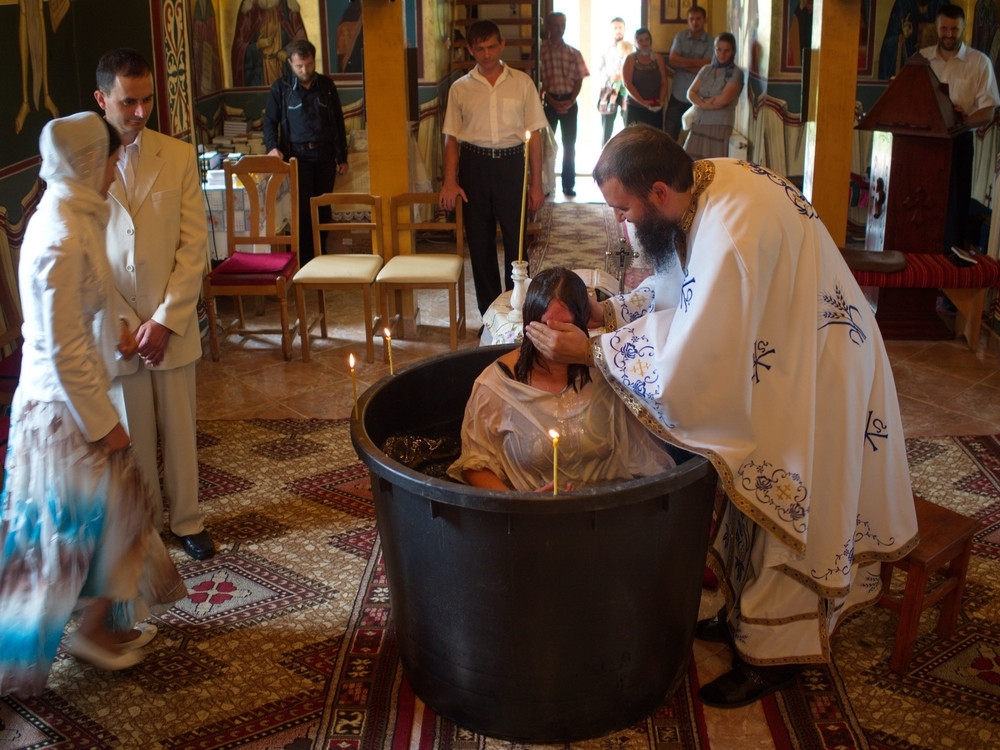“Are you born again?” If you’ve ever had a conversation about Christianity with a Protestant, they more than likely asked you this at some point. As Orthodox Christians, how do we answer such a question? What do we believe happens during Holy Baptism? And how do our beliefs about Baptism differ from virtually everyone else in the Christian world?
Estimated reading time: 3 minutes
Baptism as the New Birth
First, it is important to know where this phrase – “being born again” – comes from. Christ mentions being born again rather early in His ministry. Conversing with Nicodemus, Jesus states unless a person is born again, he cannot see the Kingdom of God (John 3:3). However, a few verses later, Christ elaborates a bit more, saying we must be born of water and the Spirit (John 3:5) to see and enter the Kingdom. This later verse (and thus the full context of Christ’s words) is the source of the Church’s teachings on the sacraments of baptism and chrismation. “Water” has always meant the mysterious waters of baptism. And “the Spirit” refers to the Holy Spirit, which the believer receives during the mystery of chrismation.
This, then, is our new birth. Our being born again. We are joined to Christ in the water of baptism and receive His Holy Spirit through anointing in chrismation. It is not, as Protestants understand it, a purely intellectual experience of “accepting Christ as your savior”.
Being born again is necessary for salvation
Many Protestants will stress that you must be born again to be saved. In a technical sense, this is absolutely correct. But here again we diverge from our Western brethren in our understanding of salvation. What does it mean to be saved? To the Orthodox, salvation is more than forgiveness of your sins. It is more than a one-time mental acceptance of Christ and His teachings. Salvation is an ongoing process through which we attain communion with God and become by grace what Christ is by nature. Our humanity is restored to its original state before the Fall, and we can have a real flesh-to-flesh relationship with Christ, who took on our humanity and perfected and honored it.
Throughout the Epistles, we learn that this new birth is necessary for salvation. We die to sin; then, buried with Christ and risen with Him, we unite ourselves to Christ and His Body, the Church. In the waters of baptism, “the washing of regeneration and renewing of the Holy Spirit,” we are cleansed, justified, and sanctified (Titus 3:5). However, we must make an important clarification here: without repentance and faith, immersion in this water has no effect.
Why is baptism so important?
Many Protestant Christians bypass baptism and stress only faith or acceptance of Christ. But why is the actual physical baptism necessary? Why is it so important?
In our new birth, an incredible mystery takes place. We cannot explain how it happens, but we know that it does, for our Lord told us so. Not only that, He modeled for us what baptism should look like. In baptism, we physically immerse ourselves in the water thrice, in the name of the Father, the Son, and the Holy Spirit. Just as Christ actually died on a cross and rose again after three days in the tomb – through His faith and God’s grace – we do the same in our baptism. In other words, those waters are made effectual through our faith and God’s grace, through a mystery beyond our comprehension.
Have you been born again?
In summary, the next time someone asks you this question, you (as an Orthodox Christian) can answer with an emphatic, “Yes!” You have been born again, for you died with Christ in the waters of baptism and rose to a new life in His resurrected humanity. Through your faith and God’s grace, you have become a child of God through adoption, and the path of your salvation has spread out before you. Now, all you have to do is walk that path.
Read More: The Biblical Case for Infant Baptism >>

